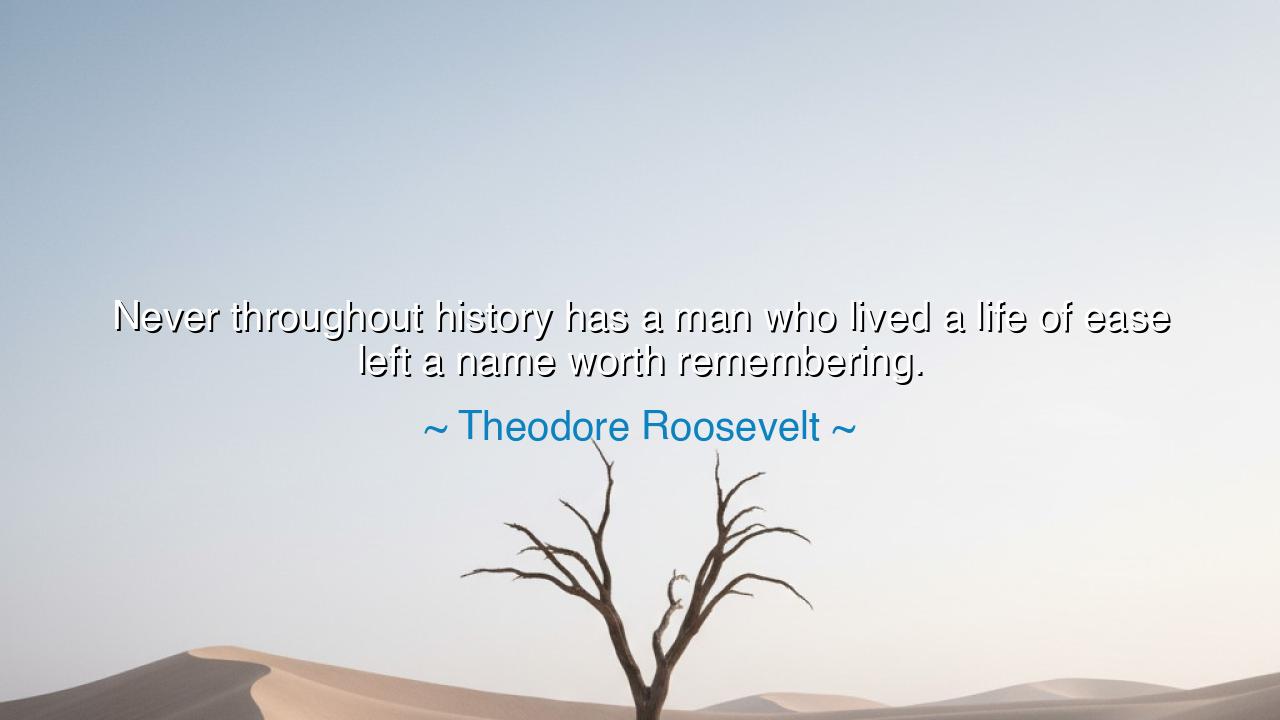
Never throughout history has a man who lived a life of ease left
Never throughout history has a man who lived a life of ease left a name worth remembering.






“Never throughout history has a man who lived a life of ease left a name worth remembering.” — Thus thundered Theodore Roosevelt, the Rough Rider, the champion of vigor and duty, the man who believed that greatness is carved not from comfort, but from struggle. His words are a cry against the softness of complacency, a challenge to the human spirit to rise above luxury and indolence. In this single sentence, Roosevelt proclaims an eternal law: that enduring glory is born from hardship, that the fires of adversity forge the souls of heroes, and that ease, though sweet to the senses, is poison to the will.
To live a life of ease is to float upon still waters, untouched by the storms that give shape to strength. It is to avoid the labor, the conflict, and the pain that refine character and purpose. Roosevelt, a man who wrestled with sickness and weakness in his youth, knew this truth intimately. Born frail, with lungs that failed him, he refused to be conquered by his own body. He fought his way into health through sheer force of will—riding, boxing, exploring, pushing the limits of endurance. His philosophy was not born in comfort, but in the crucible of struggle. He learned that comfort breeds decay, while challenge awakens greatness. Thus, his words stand not as condemnation, but as invitation—to live bravely, to strive, to dare.
History, he reminds us, bears witness to this truth. The names that echo through the ages are not those who lived softly, but those who suffered, fought, and persevered. Abraham Lincoln, born in a log cabin, rose from poverty to guide a fractured nation through war and emancipation. Joan of Arc, a peasant girl, faced armies and flames for her faith and country. Nelson Mandela, imprisoned for twenty-seven years, emerged unbroken to heal the wounds of a divided land. None of these lived easy lives; each walked through the shadow of pain. Yet it was precisely that pain that made them great. Their trials became their anvil, and from it, they shaped destinies that would outlive centuries.
Even in Roosevelt’s own age, he saw the danger of comfort—the creeping softness of civilization, the growing temptation to seek pleasure over purpose. He called this the “strenuous life,” not merely of the body, but of the spirit: a life that embraces labor, responsibility, and moral courage. He believed that nations, like men, decay when they grow too comfortable. The republic that rests on its laurels, that trades duty for decadence, begins its fall. In his eyes, work, struggle, and sacrifice were not burdens but blessings—the very path to immortality, for only those who fight for something greater than themselves are remembered when the dust settles.
Consider, too, the story of Theodore Roosevelt himself after tragedy struck. In one single day, he lost both his beloved wife and his mother. Most would have been crushed beyond recovery. Yet Roosevelt, rather than retreat into despair, turned his pain into motion. He fled to the wilderness of the Dakota Badlands, where the biting cold and rugged solitude became his companions. There, in the silence of that harsh land, he rebuilt his spirit. When he returned, he was stronger—both in body and in soul. His name endures not because he lived easily, but because he lived fiercely, wrestling with grief, labor, and fate until he bent them into strength.
The message, therefore, is not that ease is evil, but that ease alone produces nothing lasting. Pleasure passes; struggle endures. The greatest names in history belong to those who embraced discomfort for the sake of purpose—scientists who labored in obscurity, artists who starved for beauty, explorers who crossed unknown seas, reformers who faced ridicule and imprisonment. Their lives were not easy, but they were meaningful. They lived not for the pillow of comfort, but for the mountain of achievement. Their reward was not rest, but remembrance.
Let this be your lesson, O listener: flee not from hardship, for it is the teacher of greatness. Seek not the life without friction, but the life with purpose. When struggle comes, greet it not as an enemy, but as an ally that will forge your spirit. Choose action over apathy, challenge over safety, truth over convenience. The man or woman who dares, who works, who endures—these are the ones whose names time will not erase.
And so remember, as Theodore Roosevelt declared, that no life of ease ever built a legacy worth recalling. Comfort fades, but courage endures. The marble of history bears only the names of those who struggled, who bled, who rose again. Therefore, live as they did—strive boldly, suffer nobly, and leave behind not the memory of ease, but the echo of greatness. For in the end, the measure of a life is not how softly it was lived, but how deeply it was spent in the service of something eternal.






AAdministratorAdministrator
Welcome, honored guests. Please leave a comment, we will respond soon